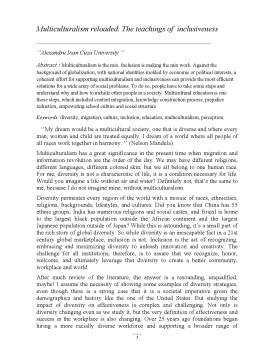Extras din referat
Abstract : Multiculturalism is the mix. Inclusion is making the mix work. Against the background of globalization, with national identities molded by economic or political interests, a coherent effort for supporting multiculturalism and inclusiveness can provide the most efficient solutions for a wide array of social problems. To do so, people have to take some steps and understand why and how to include other people in a society. Multicultural education is one those steps, which included content integration, knowledge construction process, prejudice reduction, empowering school culture and social structure.
Keywords: diversity, migration, culture, inclusion, education, multiculturalism, perception.
‘’My dream would be a multicultural society, one that is diverse and where every man, woman and child are treated equally. I dream of a world where all people of all races work together in harmony. ‘’ (Nelson Mandela).
Multiculturalism has a great significance in the present time when migration and information revolution are the order of the day. We may have different religions, different languages, different colored skin, but we all belong to one human race. For me, diversity is not a characteristic of life, it is a condition necessary for life. Would you imagine a life without air and water? Definitely not, that’s the same to me, because I do not imagine mine, without multiculturalism.
Diversity permeates every region of the world with a mosaic of races, ethnicities, religions, backgrounds, lifestyles, and cultures. Did you know that China has 55 ethnic groups, India has numerous religions and social castes, and Brazil is home to the largest black population outside the African continent and the largest Japanese population outside of Japan? While this is astounding, it’s a small part of the rich story of global diversity. So while diversity is an inescapable fact in a 21st century global marketplace, inclusion is not. Inclusion is the act of recognizing, embracing and maximizing diversity to unleash innovation and creativity. The challenge for all institutions, therefore, is to assure that we recognize, honor, welcome, and ultimately leverage that diversity to create a better community, workplace and world.
After much review of the literature, the answer is a resounding, unqualified, maybe! I assume the necessity of showing some examples of diversity strategies, even though there is a strong case that it is a societal imperative given the demographics and history like the one of the United States. But studying the impact of diversity on effectiveness is complex and challenging. Not only is diversity changing even as we study it, but the very definition of effectiveness and success in the workplace is also changing. Over 25 years ago foundations began hiring a more racially diverse workforce and supporting a broader range of communities in response to the civil rights movement and a growing moral imperative to address past inequities. Since then, the concept of diversity has become more complicated. The black and white dichotomy transitioned into a rich array of cultures and classes—sometimes with similar problems and contributions, but many more times diverse and divergent. Moreover, nowadays the workplace requires sophisticated problem solving skills and flexible frameworks for using an overwhelming amount of information.
Furthermore, literature neither totally supports nor refutes the notion that racial or ethnic diversity has benefits to the bottom line, because most conclude that it depends on the context of the diversity situation. Interestingly, the comparative studies find that diversity of skills, training and experience does tend to bring about more productivity and better problem solving. And there are some statistics that are totally agree with that.
Bibliografie
- Marco Ramirez, Diversity & Inclusion: Lessons from the field, Rockefeller Philanthropy Advisor, 2008.
- Ellen Berrey, The Enigma of Diversity: The Language of Race and the Limits of Racial, The Uniersity of Chicago Press, 2015
- Fiona Citkin, Lynda Spielman, Tranformational Diversity, Society for Human Resource Management, 2011.
- Charles Taylor, Multiculturalism, Princeton University Press 1994.
- Pinsky, Robert. Democracy, Culture and the Voice of Poetry. Princeton University Press, 2002.
- Mark Kaplan, Mason Donovan, The Inclusion Divednd- Why investing in Diversity & Inclusion, Bibliomotion, Inc. 2013
- Rosado, C. (1996, October 28). Towards a definition of multiculturalism. Retrieved from http://www.rosado.net/pdf/Def_of_Multiculturalism.pdf.
Preview document
Conținut arhivă zip
- Multiculturalism reloaded - The teachings of inclusiveness.docx





